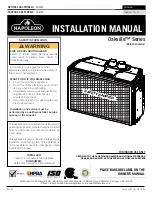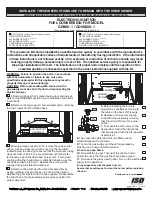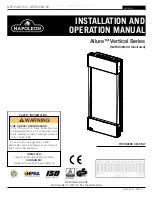
www.fmiproducts.com
122280-01E
14
VEntInG InStaLLatIOn
Continued
ASSEMBLY AND INSTALLATION OF
DOUBLE WALL CHIMNEY SYSTEM
Each double wall chimney section consists of
a galvanized outer pipe, a stainless steel in
-
ner flue pipe and a wire spacer. Pipe sections
must be assembled independently as chimney
is installed. When connecting chimney directly
to fireplace, inner flue pipe section must be
installed first with lanced side up. Outer pipe
section can then be installed over flue pipe
section with hemmed end up. Press down
on each pipe section until lances securely
engage hem on fireplace starter. The wire
will assure proper spacing between inner and
outer pipe sections.
Opening in collar around
chimney at top of fireplace must
not be obstructed. Never use
blown insulation to fill chimney
enclosure.
Continue to assemble chimney sections as
outlined, making sure that both inner and outer
pipe sections are locked together. When install
-
ing double wall snap-lock chimney together, it
is important to assure joint between chimney
sections is locked. Check by pulling chimney
upward after locking. Chimney will not come
apart if properly locked. It is not necessary to
add screws to keep chimney together.
FIRESTOP SPACERS (V3600FS-8DM)
Firestop spacers are required at each point
where chimney penetrates a floor space.
Their purpose is to establish and maintain
required clearance between chimney and
combustible materials. When pipe passes
through a framed opening into a living space
above, firestop must be placed onto ceiling
from below as shown in Figure 14.
Figure 14 - Firestop Spacer with Living
Space Above Ceiling
Figure 15 - Firestop Spacer with Attic
Space Above Ceiling
If area above is a living space, install
firestop below framed hole.
If area above is an attic or insulated area,
install firestop above framed hole.
They also provide complete separation from
one floor space to another or attic space as
required by most codes. When double wall
pipe passes through a framed opening into
an attic space, firestop must be placed into
an attic floor as shown in Figure 15.















































